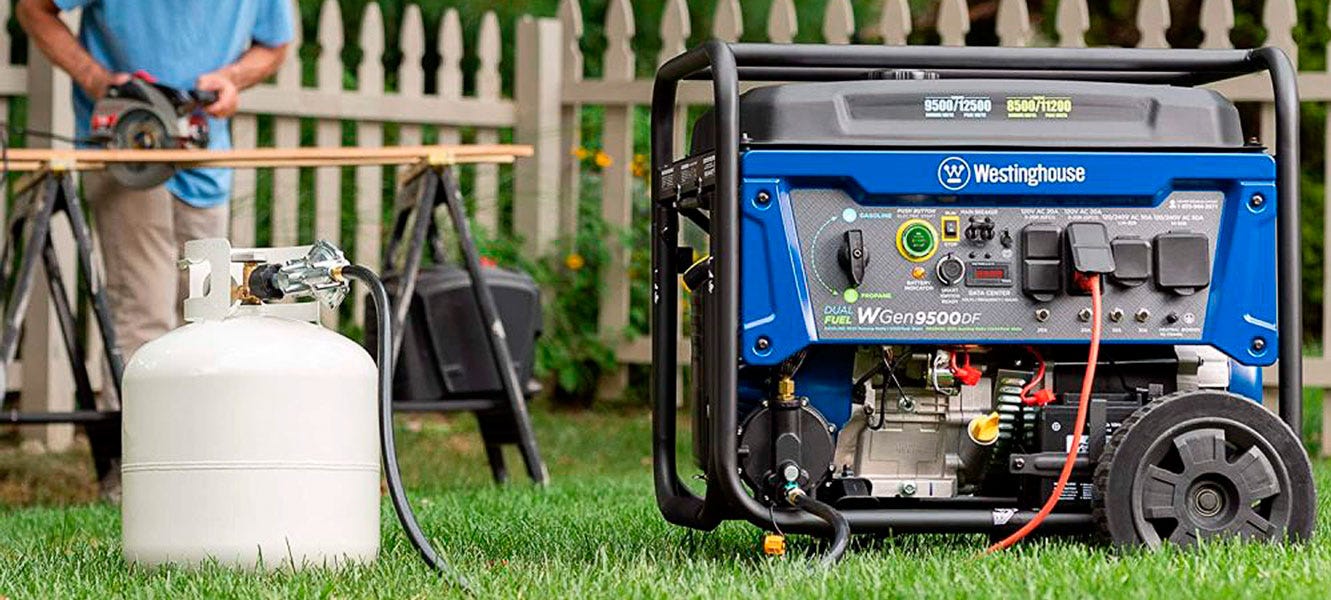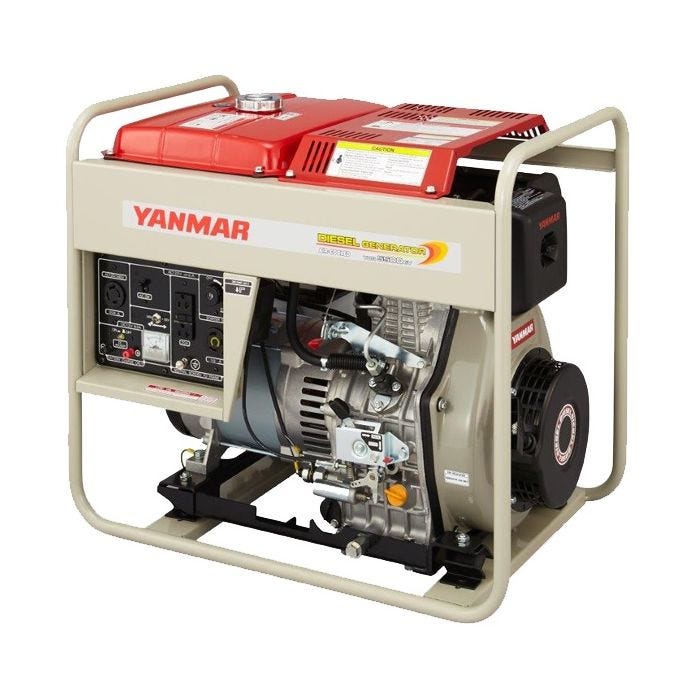Second of a series of articles that will run through the ins and outs of buying a generator
In the last article we talked about some the decisions you needed to make before deciding to buy a generator, if you missed it, here is a link to go back and check it out.
In the USA only 15% of households have a generator, out of that 15% only 6% are permanent home standbys. That makes portables the largest slice of generators for home backup. It makes sense they are relatively cheap to by easiest to add to your home
So lets assume you decided a portable is the best way to go. This field is wide open, it seems everyone is making a portable these days. You can buy the full range of quality and price, with a variety of fuels. Amazon even sells a mini generator with a two-cycle engine (same as a chainsaw) for less than $200 (I don’t recommend them). One thing to keep in mind is portables love to advertise their “surge” watts, not the actual running watts. They pretty much all do it, so pay attention to the smaller print running watts, as that is what matters. So, let’s explore some of the attributes you should explore.
What type of fuel is best? That really depends on your situation, but let’s run through the types available.
Gasoline: by far the most popular fuel for portable generators, and you will find the largest selection and price range in gasoline only portable generators. The advantage of a gasoline only generator is you can buy one with electronic fuel injection if you want to pay the money. Fuel injection greatly reduces the amount of carbon monoxide in the exhaust and increases fuel economy. The “but” on gasoline is storage and access during at outage. Typical pump gasoline starts to break down after 90 days, there are options I will discuss later. During a large power outage fuel station pumps won’t have power, and the few that do often run out of fuel in short order. So, keeping a gasoline generator fueled can be a challenge.
Dual Fuel: the next largest category of fuel choice for portables is the dual fuel generator that can run on gasoline or propane. This gives you the advantage of running off a propane cylinder, or your main propane tank if you have one. You can also fall back to gasoline if you need to. Pay attention to the output rating on propane as it will be less than gasoline. If you’re using portable cylinders, propane has similar issues to gasoline during an outage. Demand may be less so the supply may last longer. If you are running on propane in cold weather, you may want to get a propane tank electric heating blanket, otherwise your tank may frost up and stop providing propane gas. The greatest advantage to propane is its practically unlimited storage life.
Tri-fuel: the category of generators that will run on three different types of fuel has a limited, but growing selection of generators available. Personally, I would not buy a portable unless it was a tri-fuel, but that’s my preference. Tri-fuel adds natural gas as a fuel selection to propane and gasoline. Having the ability to tap natural gas is a no brainer to me, but everyone needs to choose for themselves. To run on natural gas, you would need to have an available gas tap on your home, or have a plumber install a gas tap at the gas meter. Gas isn’t a DIY unless you have worked on gas before. Like propane there is a (bigger) drop in output on natural gas, so you do want to know if you generator will meet your needs on that fuel.
Diesel: as a fuel for portable generators, diesel is pretty rare, but there are a few brands out there. Yanmar, and Kubota seem to be the most popular brands, with Gillete and Winco also offering diesels. Generac offers a single diesel that stands out because of its massive fuel tank @ 12 gallons. Diesel generators will typically burn less fuel per kwh than any other portable, and their part load fuel consumption is better. However, they are particularly noisy, and the exhaust has a strong smell. Diesel fuel can be stored up to a year, but you still run into the same long term storage problems, and the same access issues during a major outage. Diesel fuel doesn’t do well in cold temps, especially around 10ºF or below. Unless its heated diesel starts to form wax crystals that block fuel filters.
What type of generator do you want, traditional or an inverter generator?
Traditional generators are made the same way generators have been made since we started using AC electricity. They are well developed, and very reliable on this point. The speed at which the engine turns (Revolutions Per Minute or RPM) is especially important to the output. So, any automatic idle needs to be turned off while powering your home. You will find two types, ones with automatic voltage regulators (AVR), and the those with capacitor excitation. It should say in the specifications. Typically, the ones with an AVR will give you much better voltage control and start motors better. However, AVR generators will usually have brushes and slip rings, which can require some maintenance. Capacitor excited are typically brushless. Winco is the most prolific user of capacitor exciters that I know of. You also want to look at Total Harmonic Distortion (THD) expressed in percentage. It is a calculation of how clean the power the generator makes is. The higher the THD, the dirtier the power. Per Google AI, when THD rises above 6% you start to get into the range that can cause trouble with electronics.
Inverter generators depend on electronics to create their sine (electric) wave with almost no THD. The RPM (speed) of the generator is not related to the frequency output, and often varies according to load. They offer clear advantages if you are running electronic equipment. They also have better fuel consumption since the RPM changes with load, so it is not running at full speed at part load. The generator is often some form of a permanent magnet generator, so there are not any parts that need regular service other than cleaning. The downside is they have poor comparable motor starting ability compared to standard generator, so not good for air conditioners and/or well pumps. They tend to come in sizes towards the small end of the portable generator spectrum. As I was editing this for posting, Duromax released a 13kW inverter generator. Nothing stays the same for long.
What about noise? The sound rating is definitely a consideration, in the specifications you should see a sound rating similar to XX dB @ 50% load @ XX feet. 70dB is considered the breaking point between loud and quiet. If noise is a concern you will want to watch those sound ratings in the specifications. Let’s just say a 90 dB rating would make you unpopular in neighborhood.
Can I run it in my garage? Not only no, but H no! The CPSC estimates there are 100 deaths each year caused by carbon monoxide poisoning from portable generators. This is why you should always buy a model with a CO safety shutoff and have several CO detectors around your home while using a generator. Monitoring sleeping areas while a portable in running is paramount. You want to follow the operator’s manual that comes with your generator for the recommended distance from your home. Always point the exhaust away from the structure. If you are concerned about the generator being out in the weather, GenTent (https://www.gentent.com/) makes a cover for nearly all the brands. If you are in a cold climate, you may want to review GenTent canopy material since some handle frigid weather better than others. If you’re worried about your generator being stolen, lock it to a solid object like a tree with a chain or cable. If you are planning to ignore this advice or build some type of permanent shelter, remember a generator also produces a great deal of heat, and needs cooling air. For more information on running portable generators, see https://www.nfpa.org/downloadable-resources/safety-tip-sheets/generator-safety-tip-sheet. This link has more information on CO poisoning https://www.nfpa.org/education-and-research/home-fire-safety/carbon-monoxide.
Where can I find a deal? If you are shopping on a budget, then the usual budget places are where you want to look. Costco has some great deals on generators, as do most of the membership warehouses. Make sure to check their website as well as the brick-and-mortar store. The best deals sometimes are not in the obvious place. The Harbor Freight Predator line has a surprisingly good reputation for being trouble free. Northern Tool has a less consistent inventory but is always a good place for a deal. Other than those, you can shop online, or check out Amazon. Just remember you get what you pay for as a rule, make sure you look at the specifications to see if it is what you want.
Most important, take your time, avoid the “today only” guy who doesn’t want to let you out the door. Also that guy that tells you that he is the expert and everyone else is wrong, run from those guys.
Next Up
The next piece will be pretty short, but important if you own a little land. We will talk about PTO generators, a great option if you own a tractor with a Power Take Off (PTO) on the back. Between now and then, go look at your tractor and see if it has one.
Recomended Reading
We are always reading the Energy Bad Boys, Isaac has been instrumental in me starting my own Substack
I am also interested in taking a look at Meredith Agwin’s book as soon as I get a little time to sit and read.












I would add the following:
Air-cooled generators are smaller, less complex, and more fuel-efficient, making them ideal for small-scale applications.
However, Liquid-cooled generators are slightly larger, more powerful, and more efficient at dissipating heat which is extremely important for extended power outages.
I've encountered too many air-cooled generators that have ceased functioning and needed replacing due to overheating, especially in LP generators which run at a higher temperature and RPM than a diesel generator.
I have a small diesel Kubota generator, liquid-cooled, and is > 20 years old.
Diesel that is "cut" with an additive for cold temperature locations requires only the glow plug to start reliably and fuel gelling has never been an issue.
With respect to noise, there are many aftermarket add-on mufflers or baffles which will quiet even the loudest generator.
Good info. As probable blackouts increase, interest in generators will also increase.